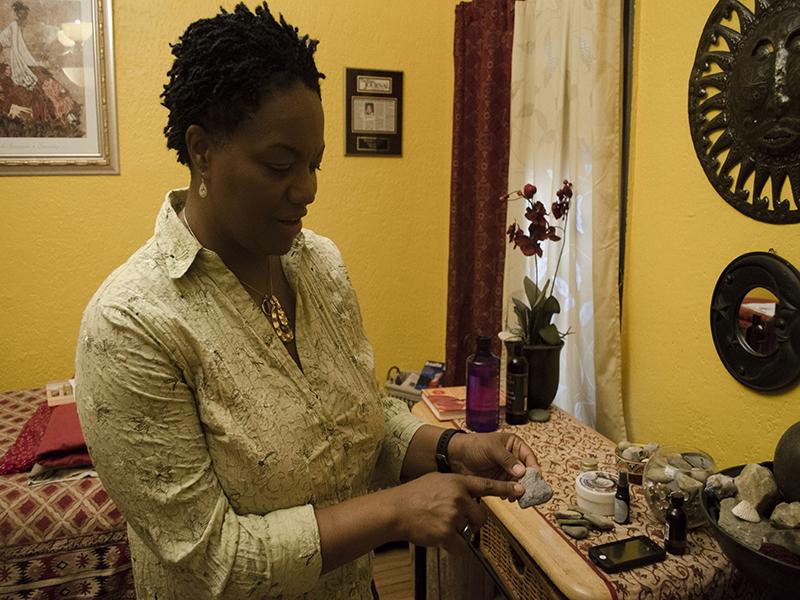In her office on Buffalo Street — dark, apart from the morning sun leaking in around the curtains — Michelle Berry is reciting her mantra.
“Just for today, do not worry,” she says. “Just for today, do not anger.”
Slinking around the room, Hart, her resilient, 16-year-old orange tabby cat, is silent behind the sound of rain pouring from a sound soother in the center of the room. Only the few unruly tufts of fur on his back catch the light, and so he quietly searches for a place to lie down, cloaked in shadow. A guitar sounds out from beneath the rain.
“Just for today, be grateful for our lessons,” Berry continues. “Just for today, earn your living honestly.”
This is the beginning of a reiki session, and it always begins this way. Reiki is an alternative healing practice that relies on touch and human presence to interact with individuals’ energies — what could be considered one’s metaphysical condition at that time. It’s one of several holistic healing methods that have found a presence in Ithaca, with practitioners around town offering the city courses and sessions in energy work, spiritual consulting, reiki and more. They’re all endeavors to treat the sources of ailing stress and anxiety, a pursuit that Berry said is reflected in the city population.
“I feel like Ithaca is a home for understanding that many people in traditional practices are treating symptoms,” she said. “There are numbers of us. We’re not outnumbered. There’s a good chunk of people who understand that we have to treat root cause.”
Berry, who was introduced to reiki during a dark period during her graduate studies, found herself returning to Ithaca for a several reasons: city council, her career as a college professor, and the hope to make it the home of her own reiki studio.
“I moved here planning to practice here,” she said. “I went back to New York, I went to Washington, I worked television, and everything kept pointing me to Ithaca.”
The explanations for Ithaca’s draw for alternative healing vary from source to source. While Berry found herself seemingly beckoned back to the the city, Melissa Hoffman, director of Ithaca’s Foundation of Light — an interfaith spiritual center that offers a space healing, meditation and education — said she thinks Ithaca offers its own particular energy that makes it a good fit for these businesses.
“Many people say there is a distinct energy that Ithaca holds, and that they travel all over and there’s something very unique about Ithaca,” Hoffman said. “I do believe that … we are very fortunate in that we have two pretty large teaching institutions, which bring in a lot of that creative force, a lot of that inspiration.”

Gary Ferguson, executive director of the Downtown Ithaca Alliance, said he’s noticed an increase in spiritual healing — and health and wellness–based business in general — both in the downtown area and the Ithaca region as a whole over the last decade. The DIA is a not-for-profit organization that heads the development and management of downtown Ithaca.
Ferguson attributed the growth to intelligence among Ithaca residents
“I think it’s a function of the people who live here having education and being a very literate population,” he said. “So knowing a lot about what the options are that are out there and what opportunities there are in alternative healing and alternative lifestyle.”
While many of these spiritual practitioners admit that skeptics abound — some they choose to appeal to, some they do not — there’s little fear for the future of healing in Ithaca. Margaret Snow, who, along with reiki and meditation, offers archetypal consulting — exploring clients’ universal archetypal patterns to help identify the repeating stories in their life. — opened the new location of her practice in September, within the Integrative Medicine Center on West State Street. She said these approaches to wellness are gaining interest because of a rising interest in self-health and healthcare.
“I think people really are starting to want to take a little bit more control of their body and their health,” she said. “It used to be that you go to the doctor, and if he told you to do something, or this was the medicine you needed to take, “You didn’t say ‘why,’ you just did it. And now people are really starting to participate in their own healthcare.”
However, Snow and Berry are both quick to emphasize: their practices do not, and should not, take the place of medical help. Regardless of approach, it’s this reduction of stress that seems to be uniform between all these practitioners. Ultimately, Berry said they are seeking to remedy the unease of stress, anxiety and trauma, their endgame being simple: make for a better state of being.
“I think comfort is the key, and it’s not excessive and it’s not indulgent,” she said. “I think something about self-care, and self love in our culture is seen as narcissistic and greedy, and not appropriate. I believe that those teachings are incorrect, I don’t know how you could love anybody else if you can’t love yourself.”







